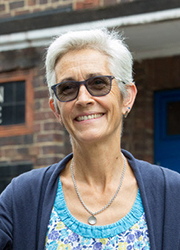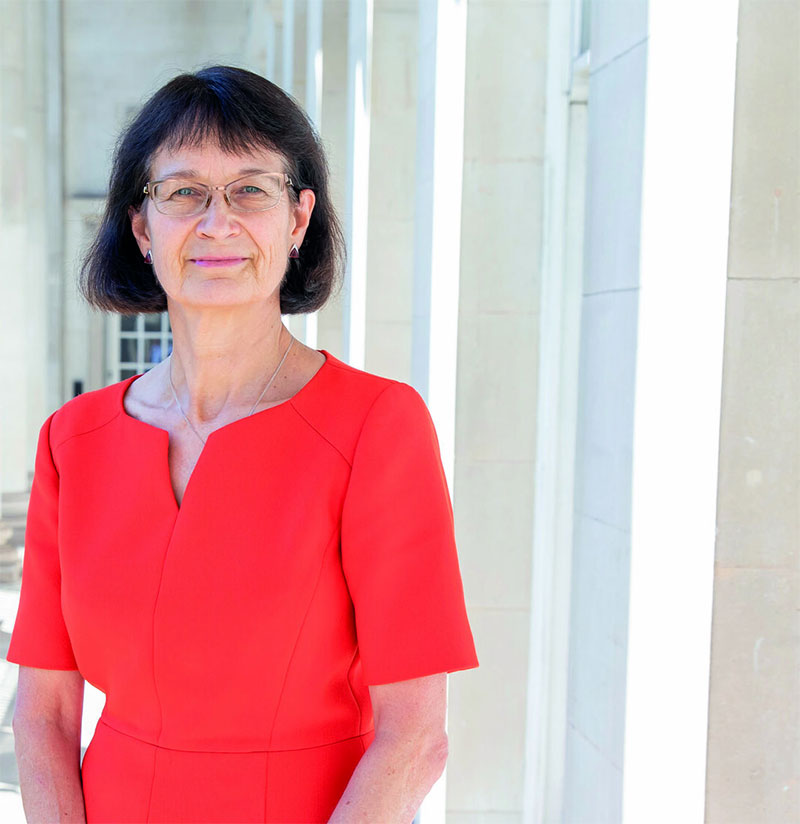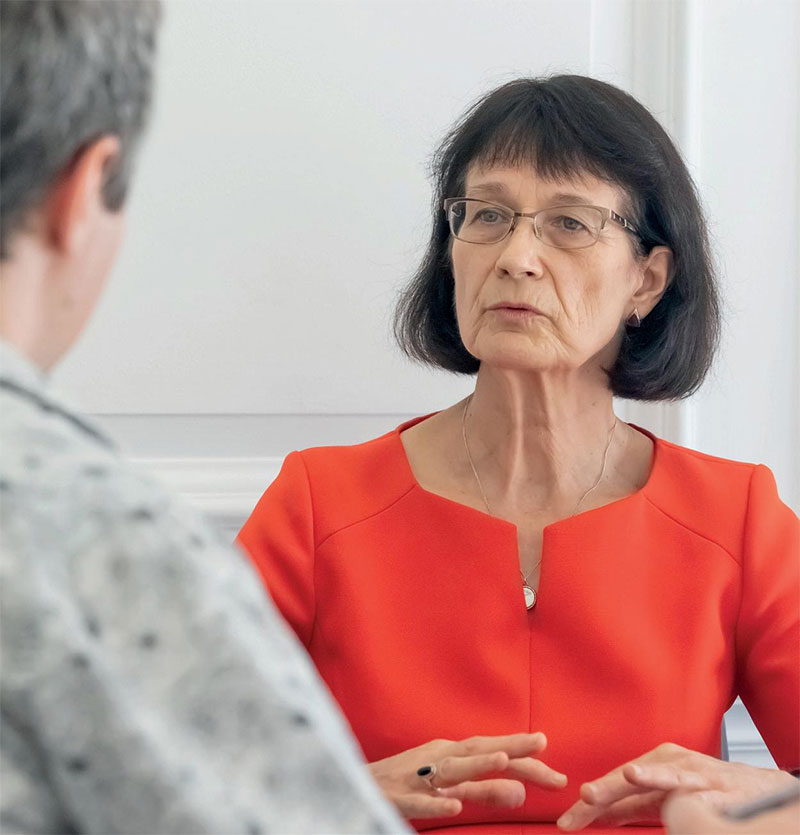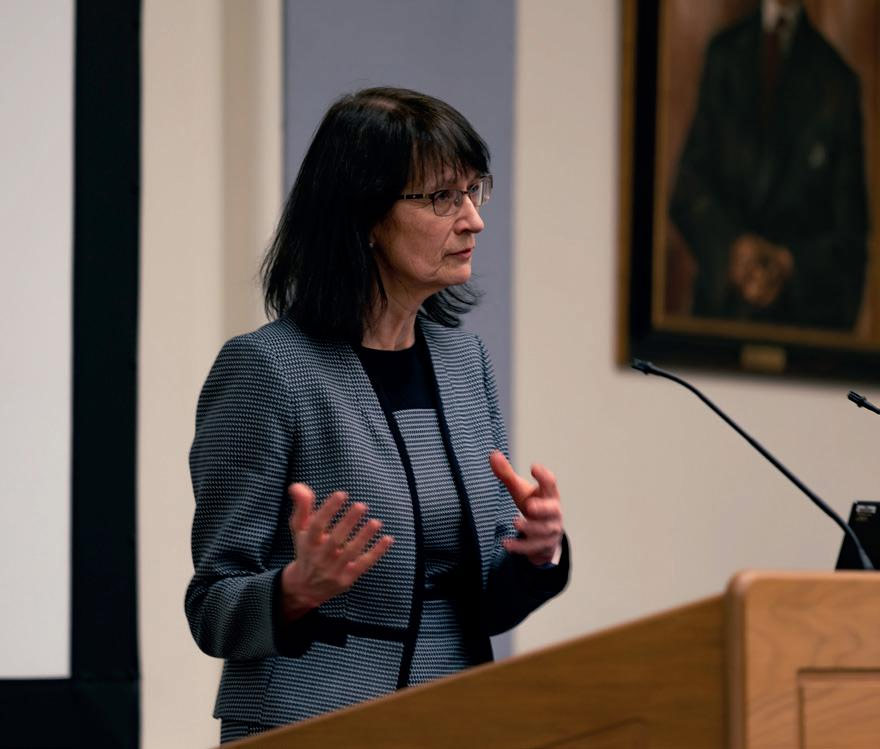

GP Lives: Shaking up the system
This article is from the GP Frontline archive and was originally published in September 2022
Professor Dame Jenny Harries, Chief Executive of the UK Health Security Agency, and Deputy Chief Medical Officer during the COVID-19 pandemic, talks to GP Frontline about learning from crises – and being scrutinised in the public eye.
As inaugural Chief Executive of the UK Health Security Agency (UKHSA), Professor Dame Jenny Harries now oversees some of the labs where her father, a virologist, once worked visualising coronaviruses using electron microscopy.
At a recent event at Oxford University on pandemic preparedness, she describes seeing her father, who passed away at the start of the Covid-19 pandemic, staring back at her from a photo on one of the slides. “It's gone full cycle in the family, which was completely unintentional but quite satisfying,” she says.
Dame Jenny wants to make one thing very clear: we are still in a pandemic. It's something that comes up three times in the first five minutes of our conversation – and continuing to manage it, albeit in a more proactive way, is her top priority as head of the UKHSA.

Arguably best known as Deputy Chief Medical Officer for England during the Covid-19 pandemic, Dame Jenny was a very public face of the crisis, regularly appearing at the Government’s daily press conferences alongside Chief Medical Officer for England, Chris Whitty, former Deputy Chief Medical Officer for England, Jonathan Van Tam, and others. “Between us, we had probably all the right skills and experience across completely different settings,” she says, keen to emphasise that leading the vaccination response was very much a team effort.
Now at the helm of the UKHSA, Dame Jenny stresses that whilst continuing to manage Covid is a big part of the role, significant other work is also ongoing. “We've had Lassa fever. We've had monkeypox. We prevented children eating some potentially salmonella-infected chocolate just before Easter. “We focus on health protection, protecting communities, preventing health threats and responding to those that arise. We do chemical, biological, radiation and nuclear response. We're using cutting edge data and analytics and scientific and genomic skills to have a really fast response.”
UKHSA replaced Public Health England last October, retaining its health protection and science elements along with the Joint Biosecurity Centre – the data and analytics element set up for the pandemic – and NHS Test and Trace. All of PHE's longstanding preventative work, including smoking cessation, nutrition and promotion of physical activity moved to the Office for Health Improvement and Disparities (OHID) in the Department of Health and Social Care.
On NHS Test and Trace, which has received widespread criticism due to its cost – 37bn between 2020-22 – and use of private companies, Dame Jenny is not in full agreement with all the points detractors have raised, highlighting the 'miraculous' scale, size, complexity, digitalisation and speed of the operation. “We've gone a long way. We had one of the largest testing capabilities, certainly in Europe, by the end of last year, so when Omicron hit, testing capacity was not really an issue...We've gained lots of new learning,” she says, explaining how it has already been used successfully in the current monkeypox outbreak.
Learning is a theme of Dame Jenny’s overall experience of the pandemic: “Every time you're asked to do something which stretches you or you didn't quite anticipate, the learning is enormous. Assuming you come out of the other end in one piece, you've condensed years of learning into a very short time.”
It's also what will help achieve one of her big ambitions: to accomplish the 100 Day Mission to go from identification of a new variant to having a new vaccine available in 100 days. “We got to about 352 days in the pandemic. Previously it might have been five to eight years,” she explains, “with that learning and all the safeguards and governance in place, the 100 Day Mission is realisable.”
She describes being part of the top team leading the pandemic response as 'hugely responsible', 'quite demanding', needing 'strong resilience' and 'hugely privileged'.
It's also changed her view of public perceptions of health protection response activity. “I used to think, if it was running quietly, that meant everything was smoothly going...Actually, now, I want us to be noisier.”
GPs are our public health link to every single family.
Nevertheless, she asserts it isn't UKHSA's job to tell people what to do but to 'give really clear information and the rationale for them to be able to make the decisions they feel are right for them.' “We communicate the logic,” she says, “and it's been very clear throughout the pandemic that getting different pieces of information to different communities is critical.”
That's partly where she sees general practice having a role: “GPs are our public health link to every single family across the country,” she says, “the reality is, somebody like me or my staff are a very small component of interaction with the public.”
As one of the most recognisable faces of the pandemic, Dame Jenny has been at the receiving end of harsh criticism from some sections of the media, including a particularly personal attack questioning whether she should have been awarded her damehood in the Queen's New Year Honours 2022.

It's something she plays down, particularly when asked to consider whether she thinks she received harsher criticism than her colleagues, and whether that was because she's a woman in a leadership role. “I was so busy, I may well not have noticed, I was getting on with the job,” she says. “Scrutiny is as you would expect…it's part of the job. That's good, you use it to improve. There's no point going into a senior post or public health role if you're not prepared to be scrutinised. The difficulty is where scrutiny turns into, let's just say less evidenced lines of enquiry… [that are] not productive and can be confusing to the public…and if comments and scrutiny move into abuse, that's something we need to move away from.”
She'd rather concentrate on the positives: “There is actually both a responsibility and a great opportunity in being a woman leader out there. It's undoubtedly been really positive for scientific colleagues and clinical colleagues. Many people have said how good it was to see a woman up there. So, it has its difficulties, but lots of positives too.”
And despite the media vitriol, Dame Jenny cites receiving her damehood in July as a highlight of her career. “If someone had suggested a few years ago that I'd end up walking into Buckingham Palace to collect a damehood, I would not have believed it. It's a very humbling experience. People say, 'it's for everybody around me' and you really feel that when you go and get it. I know exactly what they mean.”
Dame Jenny describes her career path to this point as 'slightly unintentional' and driven by 'a passion for taking evidence and information and turning it into something useful to improve people's health’. She completed her medical degree at Birmingham University, during which she also completed a degree in pharmacology, and then worked as a junior hospital doctor in a variety of specialist areas.
At this time, she was pre-occupied as to why so many people were coming through the doors of A&E with preventable conditions and what could be done to help prevent them doing so to free up capacity to treat those who could only be treated there. As she worked her way up in public health, she encountered 'a managerial element, a systems organisation element and a political one', the latter, she says, 'much to my amazement', she really enjoyed.
I don't think it's my job to relax, that would definitely be the wrong thing to do.
Having worked in health protection, working on responses to Ebola, Zika, MERS and the Novichok attack in Salisbury amongst others, she applied for the Deputy CMO role which normally deals with prevention. “You can have a bit too much excitement in health protection,” she laughs, “so I thought I'd do some health improvement work.”
It didn't go to plan; mere months after starting the role, the pandemic hit.
And whilst Dame Jenny is very clear that Covid-19 continues to be a significant threat, she thinks the last couple of months have been indicative of the next major public health emergency: climate change. She estimates that over the three or four days in July when temperatures hit 40 degrees, there would have 'probably been a significant number of excess deaths’. “It's a slower sort of incident response, perhaps, but very important,” she says.

General practice was a career option for her, having spent time working in the specialty during her medical training. She describes herself as 'a huge primary care fan' but that she doesn’t feel she's 'constructed the right way' to be a GP: “GPs have to be generalists and be able to spot the anomaly in the hundreds of patients who come through their door. Their role is unique. There are very few people who can hold the balance between the generalist and specialist bit. I admire that.”
It's not just the access GPs have to patients and the trust patients have in them that Dame Jenny says makes general practice so important to public health. She cites the potential of GP practices for data collection and research, giving a special mention to the RCGP's Research and Surveillance Centre, run in conjunction with Oxford University. “It's really important and we're really grateful to practices that are signed up. It's been going for 50 years now, which is a sign of how important it is, and there are huge opportunities going forward. It's gone well beyond monitoring respiratory disease and flu rates, which was predominantly the case before. “There's a health inequalities angle too. Having GP practices signed up in areas of deprivation is really important for our understanding and to be able to plan public health interventions. The more practices signed up, the more community and geographical reach, and the more representative we can be.”
She describes the efforts of GPs and their teams during the pandemic as 'heroic'. “They set up vaccination centres overnight, they completely moved forward in a week or two from the way they see patients,” she says. And whilst she recognises new ways of working in general practice have been controversial, she describes them as a lifeline for many patients who were clinically extremely vulnerable or found it difficult to travel.
On the scrutiny faced by those on the frontline of healthcare, she adds: “None of it should move towards abuse, that's inappropriate and it just means none of us can do our jobs, including GPs. “Many people don't understand quite how hard people have been working, because they don't understand the complexity of the roles they're carrying out,” she explains. “We're all on a little bit of a journey, we need to learn from the pandemic and keep good bits and drop bits that didn't work so well.”
As to her approach to leading an organisation that by its very nature is relentless: does she see any downtime on the horizon? “I don't think it's my job to relax,” she said, “that would definitely be the wrong thing to do.”
Thank you for your feedback. Your response will help improve this page.